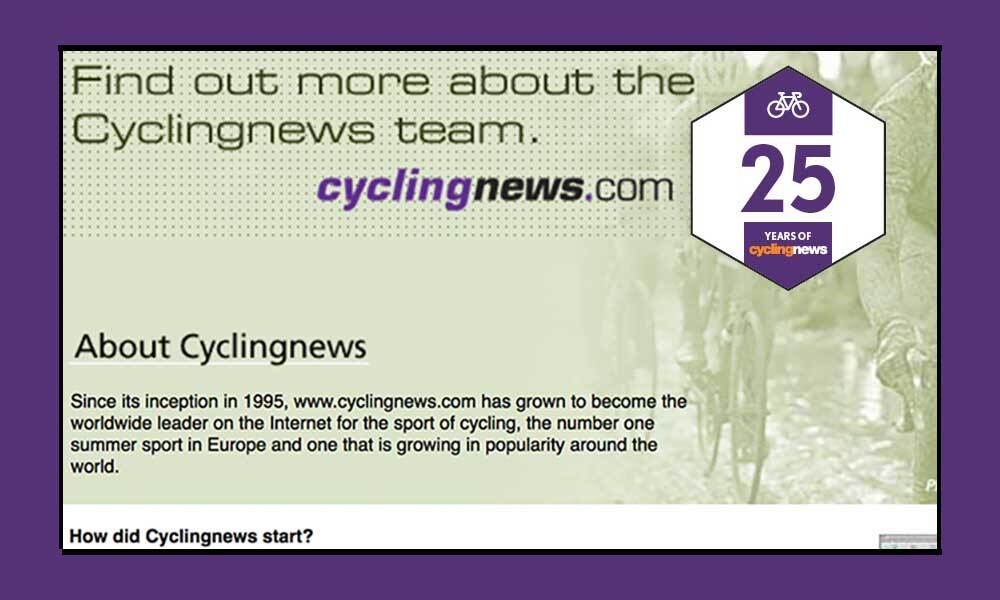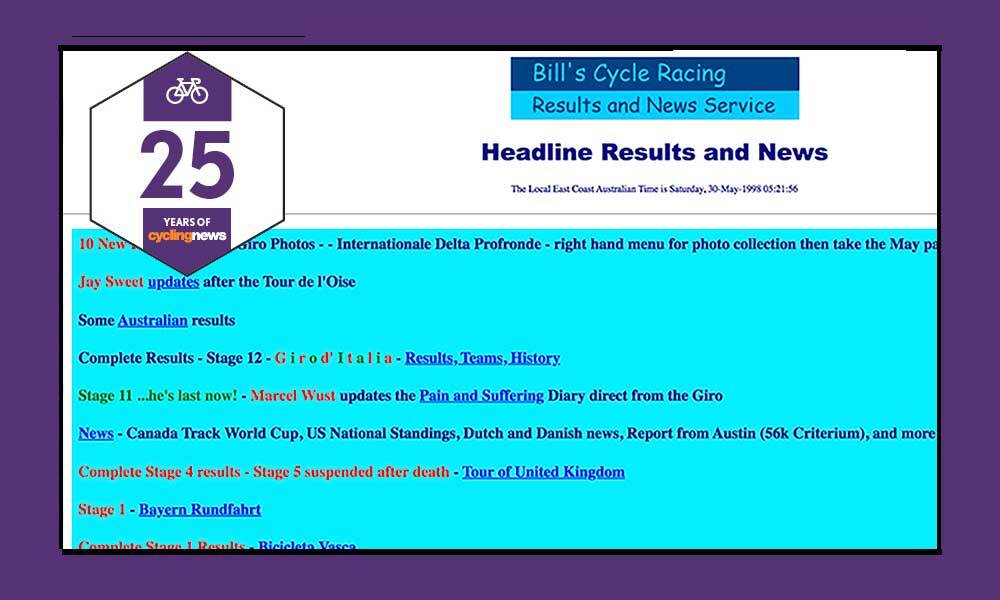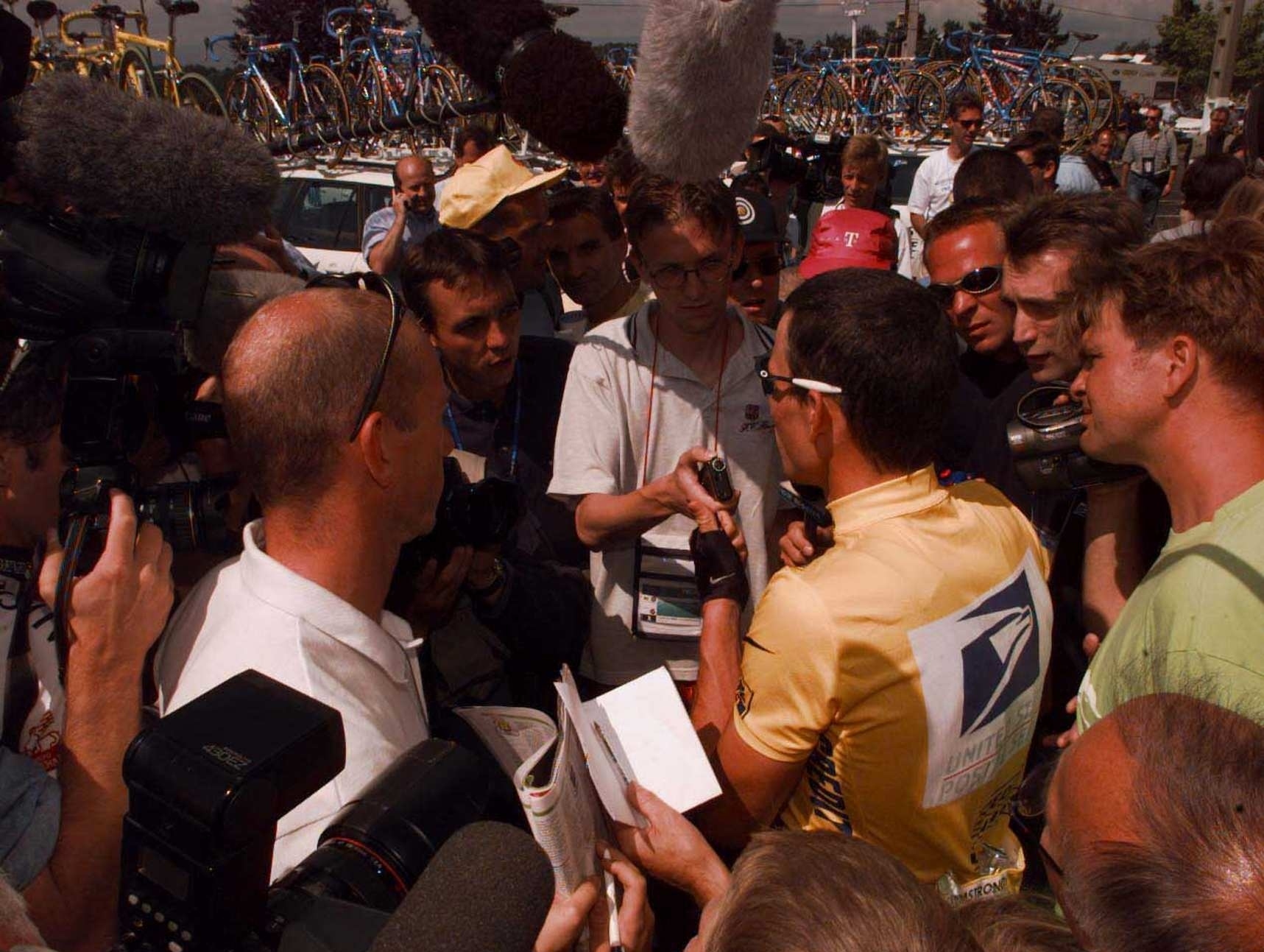Bill’s excellent adventure
The lay of the land in 1995 and how one man changed cycling reporting forever

This year, Cyclingnews celebrates its 25th anniversary and to mark such an important milestone the editorial team will be running 25 pieces of work that look back at the sport over the last quarter of a century.
The landscape within professional cycling has transformed massively since the site was first launched back in 1995, with seminal moments such as the Festina Affair, Operacion Puerto, the rise and fall of Lance Armstrong and the emergence of new stars like Peter Sagan and Chris Froome shaping the sport as it is now.
Before we begin to roll out our 25 stories we go back to where it all started and talk to Bill Mitchell, the man who founded Cyclingnews.
Cyclingnews may have been founded in 1995 but its roots can be traced back three decades prior when a young boy by the name of Bill Mitchell accompanied his father to the Milk Six at the Melbourne velodrome in the 1960s. The venue for the 1956 Olympic Games was still in its pomp, with a near 8,000 capacity crowd packed in each night as the best riders in the world went head-to-head under a flushed evening sun.
The Mitchells were very much a working-class family and their attendance at the Milk Six came about because Bill's father worked for the Australian distributor at Fiat. The Italian manufacturer hosted as co-sponsor at the track races, and Bill would gaze at any form of Italian literature his father could get his hands on.
However, it was at the track where young Bill would watch on from the stands, mesmerized by the sights and sounds of the frenetic action, and as the sun gave way to the stars Bill would inevitably fall in love with the sport.
"I was just absolutely fascinated by it," Cyclingnews' founder says with a broad smile. "I loved Campagnolo, the finish on the groupsets, and I'd rush to the newsagents to buy this Italian cycling magazine. I'd look at the pictures and would love to dream.
Get The Leadout Newsletter
The latest race content, interviews, features, reviews and expert buying guides, direct to your inbox!
"Cycling was beautiful. It was elegant, daring, relentless, and involved application and determination. Those were all qualities I wanted to be like."
By the 1970s, Bill had pursued full-time education, but he had also matured alongside his passion for cycling, and although cyclo-cross was his favoured discipline, he progressed as a regular amateur on the Belgian road racing scene. Like many riders of his time, he would leave Australia each season and venture to the heartlands of Europe.
Some years were better than others, but he kept making that long journey until his early 50s, when a bout of adult chickenpox effectively ended his racing days. He could have kept racing as a veteran but the notion of older, more rotund riders getting the better of him was enough to make him hang up his wheels.
"I resented these fat guys who weren't very fit," he bluntly, but rather eloquently, puts it. "The vet races were too short so they could just sit on and wait for the sprint. There were no mountains or hills to drop them."
Although his racing days may have come to an end, Bill's long list of contacts remained intact and by the time the 1990s rolled around Bill's knowledge and love for the sport led to the first shoots of life for the title that would later morph into Cyclingnews.
'Bill's cycling news and results service' first launched as a newsletter that was distributed among Bill's close friends in Australia. It originally consisted of newspaper cuttings from the European press that had been sent to Bill in Australia.
"People back home were thirsty for information," he says.
"We had a few high-profile Aussies in the pro peloton but there was very little reporting in the 90s. The TV coverage was next to nothing and we used to get the highlights from the Tour a week later."
Bill's newsletter evolved in conjunction with technology. First came the fax machine, which allowed for data and information to be transferred via pages. Then came the real game-changer.
"Faxes gave me more rapid information but then we got email. That opened up everything. And I remember my partner coming home from work one day and saying 'there's this wonderful new technology. It's called world wide web'."
Suddenly, Bill, with the power and full force of the three Ws, was able to keep up with the information that flooded his inbox and fax machine. His background and knowledge of coding was quickly called into action and it meant that he could update pages at relatively short notice.
Clunky race results, the enemy of the production editor, could be streamlined from various sources and displayed in tabulated formats. It's a testament to his legacy that a number of the parser methods Bill pioneered at the time are still used by the Cyclingnews production team to this day.
As well as exercising his coding credentials, Bill could also rely on his friends back in Europe for information and news. Core to Bill's ethos though was a distinct policy of ensuring that all races were treated equally. It didn't matter if you were the Tour de France or the Tour of Murray River – you were still going to appear on Cyclingnews.
That ensured Bill had to adapt on the fly at times. Originally the servers at the university where he worked had carried the load for the results service traffic but as the site grew, so did the need for a more robust set-up.
"I ran it off a little server in my office at the university. One day the IT manager rang me up and said, "Bill your site is getting more traffic than the whole Uni put together.' I knew that the game was up and that we'd have to shift it. We registered the domain and it took off from there.
"At the start, I was providing information for between ten and fifteen friends and it just went from there. I'm good at writing shortcode for results and I had good friends in Europe that were sending me information, and once the site started it just took off.
"I was in Melbourne recently and guy in his thirties came up to me and said, 'You're Bill Mitchell… you won't remember me but I was an 11-year-old cyclist and you published results from my local races.' It was unbelievable to hear that, but my philosophy was to build up a grassroots movement that would share information."

The site snowballed as it began to gain momentum and an audience. One has to remember that during that period, the online presence for media brands was scattered to say the least. The internet was seen as a fad and an afterthought for boomers in publishing who gripped to their print media as if the future didn't matter.
However, with the growth of the American audience, and through Bill's own dedication, the site quickly established itself as the go-to homepage for English- speaking cycling fans in the States, the UK, and of course, Australia.
"It went crazy," he says. "More and more people started to find the site and people realized – especially in America where people were getting into cycling because of Lance Armstrong – that we had the races from the UCI calendar, the national calendar, and all the local events.
"I had all these correspondents sending in race results and I decided that I'd be very liberal and democratic and just published everything."
The invention of live race text coverage also started with Bill. He and a Dutch journalist Hans Wilbrink, who sadly passed away last year, began covering every race that appeared on Dutch television. Their live text coverage processes were basic if not cumbersome. Wilbrink would watch the races from his home and then every 20 to 30 seconds he would fire an email to Bill in Australia.
Because of the time differences, Bill would be at his computer in the small hours of the morning, and he would use Wilbrink's emails to construct the narrative for live coverage. Fans would email in with questions of their own, and it soon became an online community.
Bill's stance against doping also set him apart from sections of the mainstream media. Having witnessed how doping could end careers and lives, and having taken the decision to remain on the straight and narrow as a promising amateur, Bill followed a distinctly anti-doping charter as a one-man media mogul.
These days proclaiming yourself as 'anti-doping' often means setting up an anonymous Twitter account and becoming judge and jury based off how emaciated riders look, while at the same time scoffing down your fourth bowl of cereal of the day from the comfort of your mom's basement. Back in Bill's time, it actually stood for something.
It meant going against the grain and pursuing stories. It promised reporting the real news and it meant not holding back on the facts because you were worried about the blowback. Again, context is important and what we know now in terms of doping in the 1990s wasn't as clear then as it is now.
"At the time there was only really Velonews but because they were corporate they were filtered, and because of who I am I was able to get information from everywhere," Bill says.
Velonews' publishers at the time would go on to threaten Bill with legal action after they wrongly perceived that he had plagiarized their results but in the grand scheme of things Bill had more pressing issues. The growth of the site was beginning to become a burden. He could only maintain his herculean working hours for so long, and while the site brought him a huge degree of pride it was also beginning to take a toll.
There was an emotional cost too. Bill's love for cycling was beginning to wane due to the unrelenting doping stories that came out in the late 1990s. As a one-man-band he was picking up news information from around the world and translating it for the English-speaking fans as quickly as he possibly could, but by the time L'Équipe and Le Monde began to ask questions relating to Lance Armstrong's suspicious TUE, the end for Bill's stewardship was on the horizon.
"It became more of a job and by the end of it, my career as a professor started to take on more responsibility. I was getting legal threats all the time from national team managers over the doping stories we ran. We really pushed the anti-doping message. It was just me, though, I didn't have a team and there wasn't much money.
"There was a bit of advertising but the data charges started to grow. In those days the data charges were a lot higher and we were running on a shoestring. I wrote as much code as I could to absorb the data and I had fantastic programmes but in the end I was just getting too much information. I couldn't do it anymore."

One of the earliest 'Talking Cycling' features published on Cyclingnews had been an interview with Lance Armstrong in late 1997 as he made his comeback from cancer. After Bill drew attention to the scepticism that greeted Armstrong's 1999 Tour victory in the French press, however, the relationship withered.
"Lance and I fell out of contact over that," Bill says. "He's an American and Australians have a certain concept of what Americans are like but he's brash and full-on and bigger than Ben-Hur. But we got on well. He was quite nice to me, but I was really anti-doping.
"I wasn't aware of what was going on in that team, but I did know what was going on in Belgium where I raced and in Australia, and I got massive grief over the stance we took on doping. I got death threats, legal letters, constant email abuse and telephone calls at 1am.
"It was water off a duck's back to me, I didn't care, but it was just evidence to me of the problem within cycling. For me, one of the things that Cyclingnews needed to do, given the level of prominence that we had reached, was to be more than just a results service and be an advocacy service for a cleaner sport."
With his work-life balance out of sync and his love for the sport dwindling, Bill realized it was time to pass on the torch. He could take the abuse from Armstrong fans but with the site becoming a beast, the costs ramping up, and Bill's career outside of cycling taking off, it was time to let go.
"The main reason for stepping back was far more pragmatic. I had to make a decision about whether I was going to be serious about my academic career. The scale of Cyclingnews had gone well beyond those of Bill's results.
"For a number of years, I had rode along with it as the site grew. I thought it was great but eventually I realized that it didn't add up anymore. I was a becoming a slave to it and I didn't want that anymore."
In the end Bill sold the site for around AU$20,000. It was a fraction of what Knapp Communications would make when they sold the site to Future Publishing in 2007 but Bill has few regrets. Bill's cycling news and results service wasn't about profit margins. It wasn't about the return on investments, the Tweets of the week, the Instagrammers, the synergies or the SEO.
It was about a guy called Bill who just wanted to provide a service for cycling fans all over the world. And although Bill's love for the sport has diminished, and he doesn't read the site as much as he used to because "I don't like the advertising," he still has fond memories of a period of his life that opened up the world of cycling to an audience like never before.
"I'm really happy that I created that," he says with a smile. "I never would have conceived it in the way you have now but that's just personal preference and ideology in a way.
"I know that you couldn't run the site now in the way I was doing it and the facts are evident. I couldn't sustain it. But I'm happy you've kept it going and that it's still an information service for young kids that have the same enthusiasm that I did."
The online landscape is certainly unrecognizable to the one Bill ventured into back in the mid-1990s. He's right in that sustainability has been propped up by commercialization but part of Bill's ethos and ideology, I'd like to think, still lives within the fiber optic cables and the serves that keep the site alive
Cyclingnews still strives to educate and inform and while sites have come and gone over the years, the DNA that forged Bill's results service is still here. That's due to the many writers who served over the last 25 years and of course you, our readers. But the biggest thanks are reserved for Bill, because without him there would be no Cyclingnews.
Daniel Benson was the Editor in Chief at Cyclingnews.com between 2008 and 2022. Based in the UK, he joined the Cyclingnews team in 2008 as the site's first UK-based Managing Editor. In that time, he reported on over a dozen editions of the Tour de France, several World Championships, the Tour Down Under, Spring Classics, and the London 2012 Olympic Games. With the help of the excellent editorial team, he ran the coverage on Cyclingnews and has interviewed leading figures in the sport including UCI Presidents and Tour de France winners.
